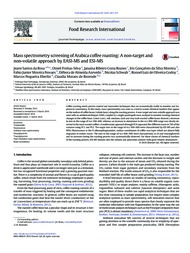Mass spectrometry screening of Arabica coffee roasting: A non-target and non-volatile approach by EASI-MS and ESI-MS.
Mass spectrometry screening of Arabica coffee roasting: A non-target and non-volatile approach by EASI-MS and ESI-MS.
Author(s): ROSA, J. S. da; FREITAS-SILVA, O.; ROUWS, J. R. C.; MOREIRA, I. G. da S.; NOVAES, F. J. M.; AZEVEDO, D. de A.; SCHWAB, N.; GODOY, R. L. de O.; EBERLIN, M. N.; REZENDE, C. M. de
Summary: Coffee roasting needs precise control and innovative techniques that are economically viable to monitor and improve its consistency. In this study, mass spectrometry was used as a tool to screen chemical markers that appear on the surface of coffee beans (whole bean) along the roasting process. A non-target and non-volatile approach was used with an ambient technique (EASI) coupled to a single quadrupole mass analyzer to monitor roasting chemical changes in the coffee bean. Green (raw), soft, medium, dark and very dark roasted coffee beans showed a decrease in ions in the range of m/z 500–600, whereas an increase in abundance in the m/z 800–900 range was clearly observed in the most roasted coffees. A multivariate approach through PCA separated the different roasts in 70% of the variance using PC1 and PC2. The major ions in the range of m/z 500–600 were characterized by ESI-MS and also HPLC-fluorescence as the N-alkanoyltryptamides, surface constituents of coffee wax layer which are almost fully degraded in darker roasts. The ions in the range of m/z 800–900 were characterized as di-and triacylglicerols and its increase during the roasting process was systematically observed. For these classes of chemical markers of the roasting process, ESI-MS showed also the sodium and potassium adducts with good relative abundances.
Publication year: 2016
Types of publication: Journal article
Unit: Embrapa Food Technology
Observation
Some of Embrapa's publications are published as ePub files. To read them, use or download one of the following free software options to your computer or mobile device. Android: Google Play Books; IOS: iBooks; Windows and Linux: Calibre.
Access other publications
Access the Agricultural Research Database (BDPA) to consult Embrapa's full library collection and records.
Visit Embrapa Bookstore to purchase books and other publications sold by Embrapa.

